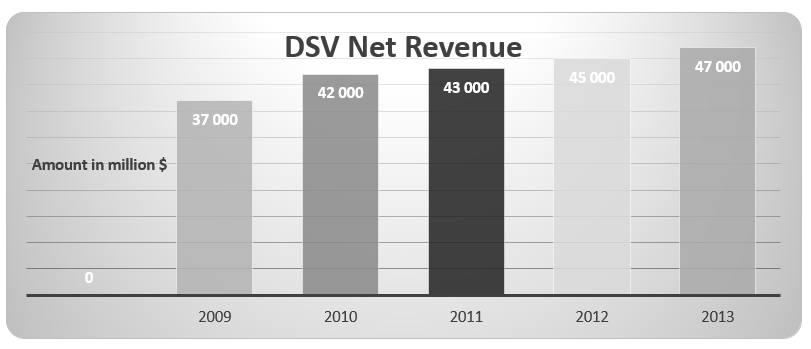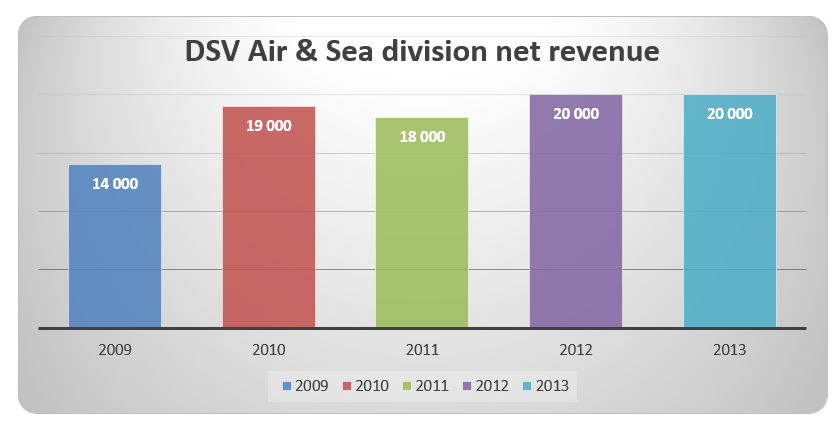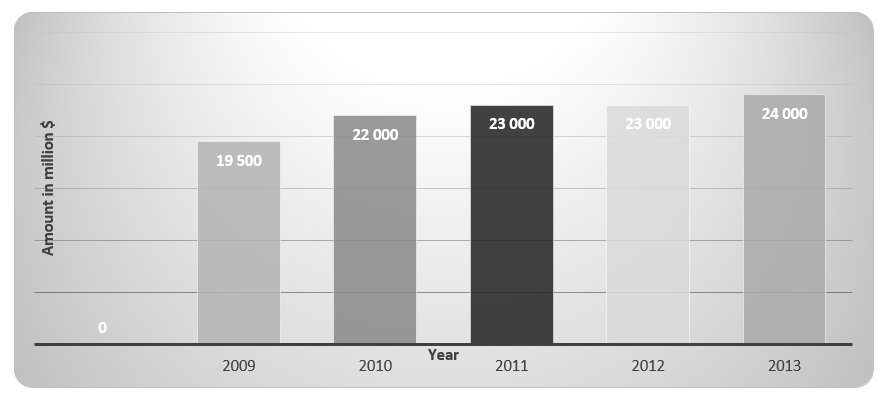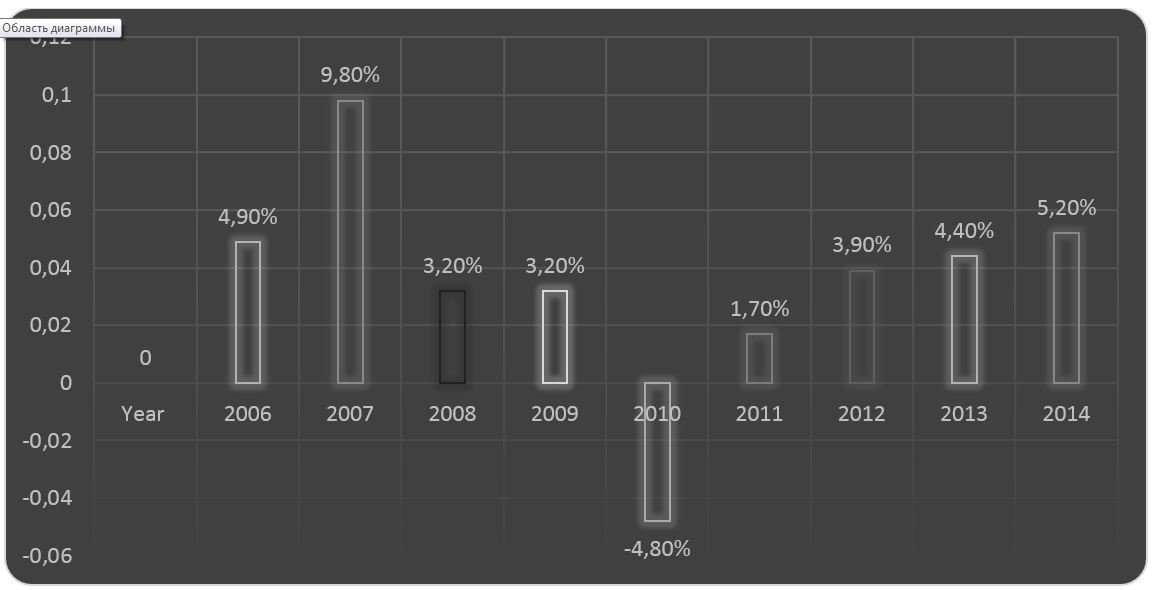Introduction
The transport and logistics industry comprises one of the fundamental economic sectors in the world. The industry has undergone remarkable growth over the past few decades. One of the factors that have promoted the industry’s transformation relates to the high rate of economic growth especially in the emerging economies.
The UAE is one of the countries that have experienced a significant economic growth in the GCC region due to rich oil reserves. In 2013, the total value of transport and logistics industry in the UAE was estimated to be $ 23.4 billion (Trading Economics, 2015). The sector accounts for 6% of the country’s total Gross Domestic Product [GDP]. The UAE’s strategic position has increased the attractiveness of global transport and logistics companies.
Moreover, the UAE’s government commitment to improving the country’s logistics systems has influenced the company’s attractiveness to local and global transport and logistics systems. One of the companies that have established a transport system in the UAE is the DSV Group. The firm has attained optimal performance in the UAE since its inception (DSV Global Transport and Logistics, 2015).
Company profile
The DSV Group is a transport and logistics solutions company that has attained global footprint. Currently, the firm operates in over 75 countries and it has a human capital base of over 315,000 employees. Previously, the DSV’s operations in the UAE were mainly through agents. However, in an effort to achieve operational efficiency, the firm established its own offices in the UAE in 2007. The company’s offices are located in Dubai (DSV Global Transport and Logistics, 2015).
DSV has undergone considerable growth over the past decades as evidenced by the high annual revenue. During its 2013, financial year, DSV was ranked sixth amongst the leading global logistics and transport solutions companies. Its total revenue amounted to 6.1 billion Euros (DSV Global Transport and Logistics, 2015). One of the factors that have contributed to the firm’s growth entails the adoption of optimal strategic management practices.
In the course of its operation, DSV appreciates the importance of partnering with its clients in order to optimise the value of its supply chain. The company serves diverse customer categories such as small businesses to multinational corporations. Consequently, the firm is proactive in adjusting its operational strategies in an effort to satisfy its customers. One of the aspects that the company focuses on entails the development of high-quality supply chain solutions by implementing effective Information Technology infrastructure (DSV Global Transport and Logistics, 2015).
DSV faces intense competition from diverse logistics companies operating in the UAE. Despite the competition, DSV has sustained a positive financial performance over the past few years, as illustrated by the trend in its net revenue, gross profits, and earnings before the deduction of special items. The graph below shows the company’s growth in net revenue between 2009 and 2013.

One of the factors that have enhanced the company’s growth in net revenue entails the increase in the volume of sea and road cargo shipment.
Operational activities
DSV Group is committed to developing and sustaining a high competitive edge in the global transport and logistics industry. Achieving competitive edge will play a remarkable role in fostering the company’s long-term survival. Therefore, DSV has organised its operational activities into a number of divisions, which include air and sea, road, and DSV solution. The various divisions at DSV have contributed to the firm’s improvement in its operational effectiveness and efficiency, hence promoting the company’s financial sustainability as evaluated herein.
DSV Air & Sea
This division specialises in offering alternative routing services under relatively flexible schedules. The division organises and implements cargo transport through sea and air. Thus, the air and sea division improves the company’s ability to meet the customers’ urgent logistical requirements around the world. Through the air and sea division, DSV serves over 250,000 tonnes of freight annually. According to the division’s Managing Director, Jorgen Moller, the global sea and airfreight market segment has experienced considerable market fluctuation over the past two years, especially during the first half of 2013 (DSV Global Transport and Logistics, 2015).
However, the market is showing signs of recovery due to the increment in the volume of trade especially between Europe-North America, Asia-Europe, and the Trans-Pacific routes (DSV Global Transport and Logistics, 2015). The graph below illustrates the trend in the volume of net revenue with reference to the air and sea division.

In line with the company’s commitment to sustain its growth within the air and sea freight markets, DSV has undertaken a number of strategic and operational measures over the past few years. One of the most notable measures involves the acquisition of a number of other companies such as Airmar Cargo, Seatainers, and the SBS Worldwide. The acquisition of Seatainers and SBS Worldwide has enabled DSV to improve its service delivery in a number of its core markets such as the US. Similarly, the acquisition of Airmar Cargo has provided DSV with an opportunity to venture into the South American market.
DSV Road
Demand for road transport in the UAE has increased considerably over the past few years due to the high rate of economic development within the country. The country has experienced a substantial increment in the volume of export and import trade due to developments within the local manufacturing sector. In an effort to capitalise on the high demand for road transport within the country, DSV has established DSV Road, which specialises in providing transport services through road. The firm has over 17,000 trucks that serve the GCC and the European markets (DSV Global Transport and Logistics, 2015).
In line with its commitment to delivering a high-level of customer satisfaction, DSV Road ensures that its operations are fast, efficient, and flexible. Moreover, the division ensures that its operations are environmental friendly. One of the strategies that the firm has adopted in an effort to adhere to environmentally friendly standards entails ensuring a high level of fuel efficiency. Thus, the firm has fitted its trucks with fuel-efficient technologies, hence reducing the amount of greenhouse gas emissions.
The DSV Road division is intermodal in nature, which means that it is comprised of both road and rail transport. By integrating the road and rail services, DSV meets the diverse transport needs of its customers. Incorporating the road and rail transport systems has also enabled the firm to reduce its carbon footprint. The firm has taken into account a number of strategic measures such as continuous product development. For example, in 2013, the company established the ‘Daily Pallet’ product, which aimed at promoting the effectiveness in handling parcels across the world (DSV Global Transport and Logistics, 2015).
In line with its commitment to enhance operational efficiency of the DSV Road division, the company undertakes continuous development on its transport systems. In 2013, the firm implemented Global Positioning System [GPS] on its 7,000 trucks. The firm’s motivation to implement the GPS trackers arises from the need to offer optimal customer services. Moreover, the firm announced its plan to upgrade its existing transport management system, which is expected to be implemented within the next 3 to 4 years.
In addition to the above aspects, DSV has also undertaken a number of measures such as the acquisition of the Ontime Logistics. The acquisition is intended to enhance the company’s market base in a number of European markets such as Norway, Denmark, and Norway. The efficiency of the DSV Road division has led to a remarkable improvement in the division’s profitability as illustrated by the trend in its net revenue between 2009 and 2013.

DSV Solutions
DSV recognises the importance of developing a strong relationship with its customers. A strong customer relationship plays a fundamental role in sustaining a firm’s level of profitability and hence the probability of attaining financial sustainability. Subsequently, the objective of this division is to nurture and sustain a strong customer loyalty, hence promoting the firm’s cost and operational efficiency. DSV achieves this goal by establishing over 130 warehouses, which are located in different countries.
Moreover, the company’s motivation towards the establishment of an extensive network of warehouses arises from the need to cater its customers located in different parts of the world. In addition to the establishment of warehouses, DSV Solutions have implemented emerging e-commerce technologies. Thus, the firm has been in a position to optimise its internal systems and processes.
Logistical systems
Storage comprises one of the fundamental logistical activities. Ghiani, Musmanno, and Laporte (2013) argue that logistics “activities concern a specific facility of the logistics system generally identified by the term warehouse” (p. 101). In an effort to achieve operational efficiency and satisfy its customer’s needs, DSV has instituted an effective warehousing system. Subsequently, the firm’s top management has developed and implemented an effective warehouse management system [WMS] functionality, which is commonly referred to as CargoWRITE. The system has improved the firm’s capacity to adjust to business changes, hence benefiting its customers.
Some of the functionalities that the WMS can undertake include data validation, vendor-managed inventory, and multi-site management. Moreover, the WMS has improved the firm’s effectiveness in undertaking diverse activities such as dock management, packing, replenishment, and vehicle loading (DSV Global Transport and Logistics, 2015).
In addition to the above warehousing aspects, DSV is committed to ensuring that its customers’ products are secure. In a bid to achieve this goal, the firm has fitted all the warehouses with an effective Internet Protocol video surveillance system, which enables the monitoring of all areas within the warehousing facilities. The IP security system has improved the firm’s ability to deliver a unique experience to customers by customising its security services. For example, the firm is in a position to meet the customer’s security needs during the storage period of expensive cargo or products.
Factors affecting the company
Companies established in the UAE transport and logistics sector are subject to changes originating from the macro business environment. Environmental changes may affect a firm’s operation positively or negatively. Thus, it is imperative for organisational leaders to be conscious of the prevailing environmental changes. As one of the industry players, DSV is not shielded from environmental changes. Some of the major factors that are affecting the company’s logistic systems are explained herein.
Logistics centre
One of the regions that have undergone considerable logistic developments is Dubai, which has become the largest logistics’ hub in the UAE. As a logistics centre, Dubai is in a position to establish a strong connection with the rest of the world. The majority of the logistic systems in the UAE such as harbours are fitted with modern and efficient technologies. For example, the harbour established at the Jebel Ali free zone is fitted with effective technologies, which can load 4 containers concurrently (DSV Global Transport and Logistics, 2015).
In addition to harbours, the Dubai government is increasingly focusing on improving logistics with reference to aviation. Developing the country’s aviation logistics will improve the Dubai’s competitiveness by improving its capacity to interconnect different countries through air. The logistic facilities coupled with Dubai’s strategic position [most of the countries in Asia are located within a few hours of flying] presents a perfect opportunity for DSV to optimise its operations by meeting the logistic and transport needs of customers located in different parts of the world through its air, sea, and road systems.
Infrastructural developments
The transport system in the UAE is characterised by a high potential for future growth. First, Dubai currently is in the process of building the largest logistics’ centre, viz. the Dubai World Central. The centre is expected to host the largest airport, harbour, and free-trade zone
Economic growth
The UAE is one of the Gulf Cooperation Council countries that have undergone considerable economic growth over the past 15 years. The country’s economic growth has mainly been spurred by its rich oil reserves. Thus, the country is in a position to export a considerable amount of oil. For example, the country’s Gross Domestic Product, which is one of the metrics used to measure a country’s economic growth, has undergone considerable improvement over the past years. The graph below illustrates that the country has sustained a positive GDP growth rate over the past few years.

Due to its strong GDP growth, the UAE government is in a position to finance logistical developments. Thus, the high economic growth is likely to promote the company’s profitability.
Issues faced by the company
DSV’s transport and logistics system is subject to changes due to diverse issues emanating from the macro-environment business environment. Some of the most notable issues include intense competition and risks as evaluated herein.
Businesses, irrespective of their nature, operate in an environment characterised by diverse risks, which underscore the adverse occurrences that can affect an organisation’s short-term and long-term performance. Subsequently, it is imperative for businesses to consider risk management as one of the integral strategic management elements. By taking into consideration the concept of risk, an organisation is in a position to make effective decisions and enhance its capacity to respond to issues that might affect the firm’s financial position.
Currently, the logistics and transport industry is characterised by changing customer demands. Thus, the industry players must implement agile strategies in order to exploit available opportunities successfully. DSV’s operations are subject to diverse risks, which include
- Changes in IT systems.
- Industry consolidation.
- Increased regulations and embargos.
- Financial risks.
The global transport and logistics industry is undergoing a remarkable transformation due to the high growth potential. Consequently, investors are increasingly venturing into the industry in an effort to exploit the industry’s profitability. Despite the fact that DSV is ranked as one of the well-established global transport and logistics solutions companies, it faces intense competition from other global and local transport and logistics companies operating in the UAE.
Some of the major competitors include DHL Logistics, Al Shola Logistics, Kuehne & Negel, and Consolidated Shipping Solutions Company. The firm ranks 6th amongst the leading transport and logistics companies (DSV Global Transport and Logistics, 2015).
Companies operating in the global transport and logistics industry are increasingly adopting the concept of consolidation in an effort to achieve market dominance. One of the most common consolidation strategies that firms are adopting entails the formation of mergers and acquisitions. The existence of such consolidation may weaken DSV’s competitiveness. In an effort to gain a high competitive edge, DSV has integrated the concept consolidation, as evidenced by the acquisition of different companies operating in the transport and logistics industry.
DSV considers IT as one of the critical components in enhancing its operational efficiency. The effectiveness of the firm’s warehouse management system is subject to technological changes. Thus, the firm must adjust its Information Technology continuously in order to provide customers with optimal services. Additionally, the firm should evaluate the effectiveness of the IT system continuously in order to ensure that there is no risk of infiltration, which might affect the credibility of the implemented security systems.
The firm’s long-term operation in the UAE may be affected by legal changes and embargoes, which have been implemented by the government. Some of the legal changes that might affect the firm include taxation and change in rules and regulations on business licensing. Conversely, DSV is subject to financial risks due to its international operations. The risks might emanate from fluctuations in the rate of exchange.
DSV appreciates the importance of effective risk management. One of the aspects that the firm undertakes entails comprehensive risk calculation. Moreover, the firm considers risk management as an ongoing business process. The firm’s success in managing risk arises from the adoption of effective risk management practices such as risk identification, risk assessment, implementation of risk, management initiatives, and continuous monitoring of the implemented risk management practices. DSV constantly undertakes scheduled risk mapping in order to identify risks effectively.
Conclusion
As one of the industry players, DSV has managed to penetrate the UAE transport and logistics industry successfully. Its success has arisen from the adoption and implementation of effective transport management practices such as the establishment of different business divisions. An analysis of the DSV case shows that establishing different business divisions enables an organisation to achieve a high level of operational effectiveness and efficiency.
The operational efficiency is spurred by the high level of specialisation, which arises from the employees’ ability to exploit their skills and abilities. The contribution of the business divisions towards the firm’s performance is evidenced by the fact that DSV has been in a position to achieve and sustain positive financial performance. Consequently, one can argue that effective transport system management at DSV has promoted the company’s financial sustainability.
In addition to the above aspects, the case study shows that DSV is focused on nurturing and sustaining a high level of customer satisfaction. For example, the firm has established an effective warehousing management system, which ensures that its customers’ cargos are secure. Thus, most customers have developed a high level of trust towards the company. In order to attain long-term business excellence, it is imperative for businesses to recognise the importance of developing customer trust. Through this approach, DSV has been in a position to cope with the intense competition within the global transport and logistics industry.
Recommendations
In spite of the previous successes achieved, DSV’s long-term survival might be hampered by the existence of diverse issues such as business risks and intense competition. Some of the major risks that the firm might face relate to change in IT systems and increased consolidation. These aspects might affect the firm’s competitiveness in the global transport and logistics industry. In order to cope with issues emanating from the external business environment, it is imperative for the firm to consider the following aspects.
- DSV has adopted the concept of outsourcing in an effort to minimise the cost of operation. One of the areas in which the firm has integrated the concept of outsourcing in its systems relates to transportation. Currently, the firm does not own the planes and ships that it uses in serving its customers. The firm must undertake effective outsourcing by identifying business partners that have well-established business networks. This move will enable the firm to penetrate the global market successfully. Moreover, the firm must establish and sustain a strong relationship with its business partners. This approach will enable the firm to attain and sustain a strong financial sustainability.
- DSV’s top management must undertake continuous evaluation of the global transport and logistics industry in order to identify the prevailing industry trends. By evaluating the industry trends, DSV will be in a position to optimise its performance by making effective operational and strategic decisions. Considering the intense competition in the global transport and logistics industry, DSV should ensure that its market assessment is extensive.
- As a global entity, DSV must ensure that its operations do not solely focus on financial sustainability. One the contrary, the firm should adopt a holistic approach.
References
DSV Global Transport and Logistics: 2013 annual report. (2015). Web.
Ghiani, G., Musmanno, R., & Larporte, G. (2013). Introduction to logistics systems management. Hoboken, NJ: Wiley.
Trading Economics: United Arab Emirates GDP growth rate. (2015). Web.
Case Study questions
- How can you describe DSV Group-UAE performance over the past decade?
- To what extent has DSV Group succeeded in managing its transport system and what operational strategies has the firm incorporated?
- What logistical systems has DSV Group integrated in its operations?
- What major issues in the contemporary UAE transport industry are likely to affect the future operation of the DSV GROUP?